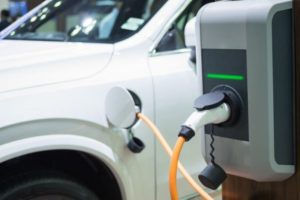 The study by Element Energy, commissioned by energy companies Enel and Iberdrola, carmaker Renault and the NGO Transport & Environment, said that a smart deployment of electric cars which charge at low-demand times and batteries that feed back into the grid at high-demand times would reduce the need to build additional grid storage and power plants. The study looked at four countries – France, Italy, Spain and the UK – and found that between them they could save €1.3 billion ($1.5 billion) each year by employing this smart vehicle charging. Enrique Moreño, a storage innovation manager at Spanish utility Iberdrola, told an event unveiling the report in Brussels on Tuesday that the difference between a smart role-out of electric cars and a dumb one will mean a difference of billions of euros. It isn’t only the cars that can optimize the grid. The batteries themselves, after they no longer have the functionality to power a car, can be reused after they are removed as batteries for the grid. There has been much concern raised about what to do with electric vehicle batteries once they reach the end of their life, because they are costly and complicated to recycle. The worst case scenario is that they are discarded into the environment. But even recycling them can cause environmental damage because of the large amount of electricity needed for the process and the use of harmful chemicals. But repurposing the batteries as storage attached to the power grid could save businesses 42% compared to the price of installing new batteries, the study finds. These batteries could store electricity at low demand times, and feed it back in at high demand times. Forbes
The study by Element Energy, commissioned by energy companies Enel and Iberdrola, carmaker Renault and the NGO Transport & Environment, said that a smart deployment of electric cars which charge at low-demand times and batteries that feed back into the grid at high-demand times would reduce the need to build additional grid storage and power plants. The study looked at four countries – France, Italy, Spain and the UK – and found that between them they could save €1.3 billion ($1.5 billion) each year by employing this smart vehicle charging. Enrique Moreño, a storage innovation manager at Spanish utility Iberdrola, told an event unveiling the report in Brussels on Tuesday that the difference between a smart role-out of electric cars and a dumb one will mean a difference of billions of euros. It isn’t only the cars that can optimize the grid. The batteries themselves, after they no longer have the functionality to power a car, can be reused after they are removed as batteries for the grid. There has been much concern raised about what to do with electric vehicle batteries once they reach the end of their life, because they are costly and complicated to recycle. The worst case scenario is that they are discarded into the environment. But even recycling them can cause environmental damage because of the large amount of electricity needed for the process and the use of harmful chemicals. But repurposing the batteries as storage attached to the power grid could save businesses 42% compared to the price of installing new batteries, the study finds. These batteries could store electricity at low demand times, and feed it back in at high demand times. Forbes
